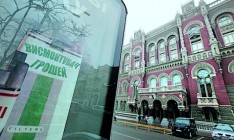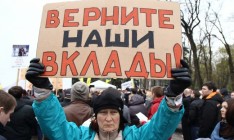Finance
banksThe government is about to find out how the owners drove their banks into bankruptcy

Under the agreement with the International Monetary Fund the Deposit Guarantee Fund (DGF) has initiated a tender for the selection of auditing firms that will conduct forensic audits of insolvent banks. The tender will be held for one month. Its results will be announced no later than in mid-January, says Deputy Managing Director of DGF Andriy Olenchyk. “But we are interested in accelerating the tender and appealed with this matter to the IMF. We have examined the public register of all auditing firms in Ukraine. In this list we found 33 companies, which have among their staff some auditors with B series certificates, that is, those authorized to conduct audits of banks,” he said. Olenchyk added that all those companies received letters with notification about the upcoming project.
Among the main criteria for the selection is the availability of at least three auditors with B series certificates. In order to eliminate the conflict of interest professionals who have previously served insolvent banks will not be allowed to take part in the forensic audit. The DGF will pay for the services of auditors. “We understand that this is not cheap. The required amount has already been envisaged in the fund’s budget in 2014, but since the process has been slightly delayed, a similar article will be included in the budget for 2015,” said Olenchyk. However, he refused to specify the amount of expenses.
A fresh eye
The audit should bring to the light the actual cause of banks being driven to insolvency. It will assess the actions of owners of financial institutions, their top managers and external factors. The resulting reports, as required by the IMF, should be made public.
After the tender results are announced audits will be conducted in one large and one small bank, according to the managers of the DGF. “In the presence of representatives of the IMF the executive management of the fund will choose institutions that will be the first in line for the audit.
Speaking about large banks, now there are only three of them in the DGF: Forum, Brokbiznesbank and VAB. As for the small financial institutions, it is important that the results of the audit are the most indicative and have overall significance. For example, it makes no sense to take Greenbank as aside from the conversion center it will show us nothing. We will take a more or less classic bank with average indices,” added Olenchyk.
Once the data for the first two audits is received, it should become a regular practice for the DGF. “Introduction of independent auditors will ensure the fund against professional errors and temptations. There is a lot of external pressure in our line of work,” said Olenchyk.
The Baker Tilly Audit Firm has already confirmed that it will participate in the tender. “Our company is participating in this competition. As far as I know, the audit will be conducted to find out why banks became insolvent. Then the fund will use these materials either in court for filing claims against the owners or as the basis for filing complaints with law enforcement agencies for legal action, presuming that the audit reveals deliberate actions of the bank’s management that led to the insolvency of financial institutions,” said Head of the Department of Auditing of Financial Institutions at Baker Tilly Oleksandr Konovchenko.
At the same time, according to the Director of the Financial Institutions Industry Group at the KPMG auditing firm Vadym Kuntsevych, similar work has been carried out in Ukraine in the past, though on an optional basis as the institution of forensic auditors in our country is in fact outside the legal field. “However, taking into account the new challenges for the DGF, this practice could be useful in determining the future of the fund, including in terms of the grounds for lawsuits. In addition, such conclusions made by an independent third party would help eliminate potential accusations of the DGF of being biased and increase its level of transparency,” said the source.
Ace in the hole?
The DGF has a serious problem with the judicial power, said an expert, who requested anonymity. “This is evidenced by the small number of open cases against the owners and top managers of insolvent banks. The DGF has a very weak legal position. Therefore, it needs to become stronger. This can only be achieved through an audit, as the arguments explaining introduction of provisional administration and a liquidator are the softest spot. Now, the DGF has no legal conclusion, rather only subjective opinions of the NBU officials,” he added. Olenchyk says as of December 4 criminal cases were opened only against 44 bankers: less than ten against the owners and the remainder against senior management.
At the same time, lawyers say an audit is unlikely to help the DGF in disputes with bank owners, who will not admit that their financial institutions are insolvent. Such disputes are quite common these days. For example, this summer there was a notorious conflict between the DGF and the owner of Forum Bank Vadym Novynskiy, who challenged the decisions of the fund in court.
In late November a new scandal erupted between Oleh Bakhmatyuk, owner of the VAB bank, which was declared insolvent, and the DGF. It is quite likely that the case will go to court. “In our case, it is an ordinary audit that will not likely have serious evidentiary value in court. All procedural codes specify that in case a special expertise is required for the hearing of disputes, the court shall appoint a forensic examination, the conclusion of which is crucial,” said partner at the Ilyashev & Partners Law Firm Maksym Kopeichikov. “This means that from the point of view of litigation it is a total waste of money”, he added.












 of the agreement of syndication with Financial Times Limited are strictly prohibited. Use of materials which refers to France-Presse, Reuters, Interfax-Ukraine, Ukrainian News, UNIAN agencies is strictly prohibited. Materials marked
of the agreement of syndication with Financial Times Limited are strictly prohibited. Use of materials which refers to France-Presse, Reuters, Interfax-Ukraine, Ukrainian News, UNIAN agencies is strictly prohibited. Materials marked  are published as advertisements.
are published as advertisements.